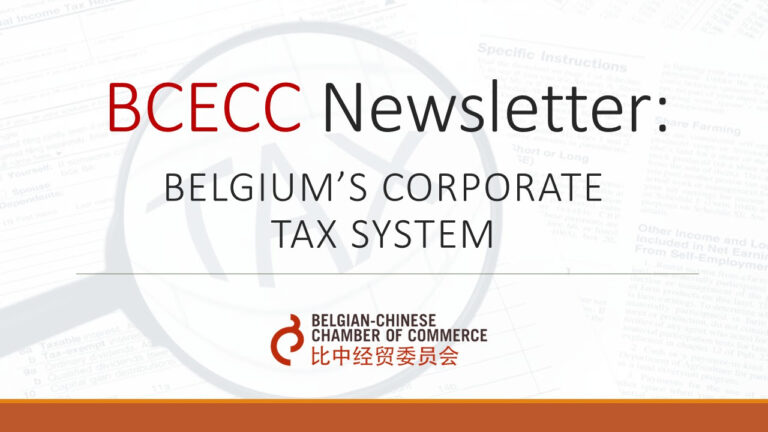For Chinese companies looking to invest in Europe, understanding the corporate tax system in Belgium is crucial to optimizing the investment process. This article will provide a detailed overview of Belgium’s corporate tax system.
Corporate income tax rate in Belgium
Belgium imposes a standard corporate income tax (CIT) rate of 25%. This applies to both resident companies and non-resident companies with a permanent establishment in Belgium. The corporate tax rate is competitive in comparison to other European countries, which positions Belgium as an appealing location for global and regional headquarters.
For small and medium-sized enterprises (SMEs), Belgium offers a reduced rate of 20% on the first €100,000 of taxable income. To qualify for this reduced rate, the company must meet certain conditions, such as being classified as a small company under Belgian law and paying a minimum annual salary of €45,000 to at least one company director. This preferential rate is particularly attractive for new or smaller Chinese businesses looking to enter the Belgian market and establish their presence with lower initial tax burdens.
Global income taxation and deductions
Belgium’s corporate tax system is based on global income taxation, meaning that resident companies are taxed on their worldwide profits, while non-resident companies are taxed only on Belgian-sourced income. Understanding this distinction is essential for Chinese companies operating across multiple jurisdictions.
Several key deductions are available to reduce the taxable base:
- Depreciation of assets, including machinery and buildings.
- Interest on business loans, particularly for loans used to finance business operations in Belgium.
- Employee salaries and social security contributions.
- Specific research and development (R&D) expenses (which can qualify for further incentives, see hereunder).
- Other possible deductions: start-up expenses (incorporation costs), contributions to charities, environmentally friendly vehicles, operating losses and bad debt reserves.
These deductions can significantly reduce the tax burden for Chinese companies, especially those investing in innovation or infrastructure within Belgium.
Tax incentives: focus on innovation and R&D
One of Belgium’s most attractive features for international investors, including Chinese companies, is its wide range of tax incentives, especially for businesses involved in innovation, technology, and R&D.
- Innovation Income Deduction (IID): Belgium allows an 85% deduction on income derived from qualifying intellectual property (IP), including patents, software copyrights, and other IP rights. This dramatically reduces the effective tax rate on innovation income and makes Belgium a competitive destination for Chinese companies developing or holding intellectual property.
- R&D Tax Credits: Companies investing in R&D activities can benefit from tax credits or deductions on their investments, particularly in areas of environmentally friendly innovation. Belgium’s robust R&D ecosystem makes it a prime location for tech companies and businesses focused on technological development. Chinese companies investing in tech, pharmaceuticals, or clean energy may find these incentives particularly valuable.
These tax incentives help Chinese investors lower their operational costs while fostering growth and innovation, making Belgium an ideal hub for research-based industries.
Capital gains and withholding taxes
Belgium offers significant relief on capital gains tax under certain conditions. For example, the capital gains on shares are generally tax-exempt, provided the company has held the shares for at least one year and the company issuing the shares meets specific criteria. This exemption is particularly beneficial for Chinese companies involved in acquisitions, mergers, or strategic partnerships in Belgium.
However, Belgium imposes withholding taxes on dividends, interest, and royalties. The standard withholding tax rate is 30%, but Belgium has signed extensive double tax treaties, including with China, which often reduces the applicable rates on such income. Chinese investors should consult the relevant bilateral treaty to understand the exact withholding tax implications for their specific transactions.
Transfer pricing and anti-avoidance measures
Like many developed economies, Belgium enforces strict transfer pricing regulations. These rules require that transactions between related entities (such as a Belgian subsidiary and its Chinese parent company) follow the arm’s length principle, meaning the transactions must be priced as though they were between unrelated parties. Chinese companies expanding into Belgium need to maintain proper documentation to justify their transfer pricing practices to avoid penalties.
Belgium is also aligned with the OECD’s Base Erosion and Profit Shifting (BEPS) initiative, which aims to prevent tax avoidance strategies. For Chinese companies operating through multiple jurisdictions, it is important to comply with these rules to avoid tax disputes and maintain good standing with Belgian tax authorities.
Compliance and reporting obligations
Belgium has comprehensive compliance and reporting requirements. Companies must submit their annual corporate income tax returns within seven months after the end of the financial year. In addition, businesses operating in Belgium are required to submit other declarations, such as VAT returns and social security contributions for employees.
Chinese investors should also be aware of Belgium’s Controlled Foreign Company (CFC) rules, which prevent companies from shifting profits to low-tax jurisdictions. Under these rules, profits from foreign subsidiaries can be taxed in Belgium if they meet specific criteria related to control and effective tax rates.
VAT
The VAT rate in Belgium is 21%. VAT must be paid monthly or quarterly, and companies can reclaim the VAT on their professional expenses. If you are selling goods to another VAT-registered business elsewhere in the European Union, the customer pays VAT at their own country’s rate. This also works the other way around. If you buy goods from another country within the EU, you will pay VAT at Belgian rates.
When Chinese companies sell products to Belgium, they must comply with the EU VAT system. If goods are imported into Belgium, import VAT is due at customs, and the importer (often the Chinese company or its EU representative) may need to register for VAT in Belgium. Once registered, the company charges Belgian VAT on local sales and can also reclaim import VAT if eligible.
Regional differences
Finally, when investing in Belgium, it is important to understand that the country is divided into three regions Flanders, Wallonia, and Brussels, each with its own economic policies, tax incentives, and regulations. While federal tax laws apply nationwide, regional authorities have the power to implement additional taxes or offer specific incentives to attract foreign investment. These can include subsidies, reduced corporate tax rates, or support for research and development, varying from one region to another. Therefore, a careful assessment of the fiscal landscape in each region is essential to optimize the benefits and understand potential costs when entering the Belgian market.
The Belgian Chinese Chamber of Commerce (BCECC) can help Chinese companies find the right expert or bring you in touch with Belgian regional authorities.
Please contact the Belgian-Chinese Chamber of Commerce (BCECC) in case you have any questions.

